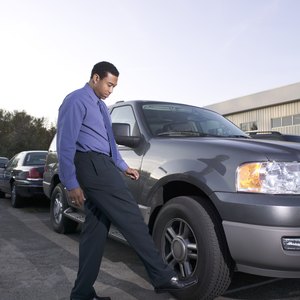
The hassle of selling your old car can wear on you. The desire to just get rid of it and move on can have you cutting corners and withholding information from prospective buyers. Understanding what you need to confess and what is better left unsaid can make the process of selling your car fair for you and the buyer -- and no more painful than it needs to be.
Truth on Demand
The information you give to the used-car buyer will sometimes depend on the questions asked. For example, if you are asked whether there are any major mechanical problems, your response may vary based on your concept of "major problems." You may consider the installation of a new head gasket to be a standard repair, while the buyer sees it as major work. In either case, you are not responsible for disclosing every detail of the car's mechanical well-being. But if you gloss over certain problems that have been repaired or reported in the past, the buyer may view a car history report and realize your attempts to cover them up, and the sale may be lost, anyway.
Damages
Severe damage should always be reported to the potential buyer for ethical and legal reasons. While some wear and tear and normal issues are to be expected, serious problems are outside the realm of fairness. For example, the buyer must be told about any car that has been flooded; such an event can leave the engine useless, the frame rusted and the interior moldy. Any car that has had a salvaged title (has been totaled by an insurance company) in the past must be reported in writing as such. The same goes for cars that have been completely rebuilt; they may have mismatched vehicle identification numbers on some parts and can cause difficulties for the buyer in the future.
Pre-Emptive Strike
If you are worried about disclosing what is wrong with your car, or you just don't know exactly what the problems are, consider taking it in to your mechanic for an overall inspection. Your mechanic can provide you with a written statement, outlining real and potential issues and making it clear to the buyer what condition the car is in. When the buyer asks what's wrong with it, you can refer to the inspection report and avoid any mistrust by either party.
As-Is
By placing the two simple words "as-is" in your used car advertisement, you take some of the heat off when questions about your car's condition come up. For example, if a potential buyer asks in-depth questions about the car's transmission or internal engine components, you can invite her to inspect the car as thoroughly as she wishes and remind her that the price you've stated is in exchange for the car as-is. This means you are not hiding anything and it is completely up to the buyer to judge the situation and make a decision. Even after the sale has taken place, these two words will protect you from any legal action or questions about the car since it was sold as-is with no guarantees.
References
Writer Bio
Robert Morello has an extensive travel, marketing and business background. He graduated with a Bachelor of Arts from Columbia University in 2002 and has worked in travel as a guide, corporate senior marketing and product manager and travel consultant/expert. Morello is a professional writer and adjunct professor of travel and tourism.

